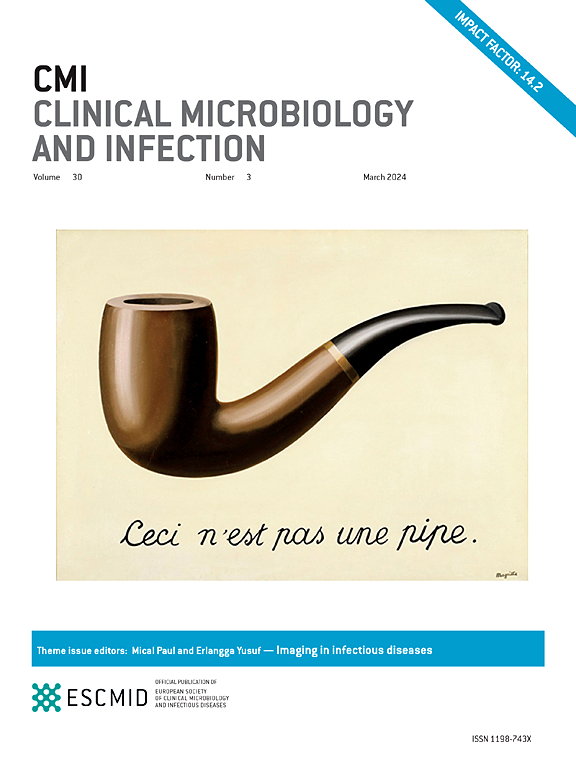Pertussis upsurge, age shift and vaccine escape post-COVID-19 caused by ptxP3 macrolide-resistant Bordetella pertussis MT28 clone in China
IF 10.9
1区 医学
Q1 INFECTIOUS DISEASES
引用次数: 0
Abstract
Objectives
China has experienced a notable upsurge in pertussis cases post-COVID-19, alongside an age shift to older children, increased vaccine escape, and a notable rise in the prevalence of macrolide-resistant Bordetella pertussis. Here, we present a genomic epidemiological investigation of these events.
Methods
We performed a retrospective observational study using culture-positive B pertussis isolated in Shanghai, China, from 2016 to 2024. We analysed strain and pertussis epidemiology dynamics by integrating whole-genome sequencing of 723 strains with antimicrobial susceptibility, transcriptomic profile, and clinical data. We compared the genome sequences of Shanghai strains with 6450 Chinese and global strains.
Results
From pre-COVID-19 (before December 2019) to post-COVID-19, patients shifted from predominantly infants (90%, 397/442) to a higher proportion of infections in older children (infant: 16%, 132/844), with the share of vaccinated individuals surging from 31% (107/340) to 88% (664/756). The macrolide-resistant Bordetella pertussis prevalence increased from 60% (267/447) to 98% (830/845). The emergence and expansion of a ptxP3-lineage macrolide-resistant clone, MR-MT28, which is uniquely capable of causing substantial infections among older children and vaccinated individuals, was temporally strongly associated with the pertussis upsurge and epidemiological transition. Although MR-MT28 showed increased expression of genes encoding pertussis toxin, it was associated with significantly milder clinical symptoms and a lower hospitalization rate. MR-MT28 likely originated in China around 2016, after acquiring several key mutations, including a novel prn150 allele, and has been detected across multiple regions in China. In addition, 26% (50/195) of MR-MT28 has evolved into predicted Pertactin (PRN)-deficient strains, with an IS481 insertion being the predominant mechanism.
Discussion
: We report that the post-COVID-19 upsurge of pertussis in China is associated with ptxP3-MR-MT28, and provide evidence that pathogen evolution is likely the primary factor driving + pertussis upsurge, age shift, and vaccine escape. MR-MT28 poses a high risk of global spread and warrants global surveillance.
ptxP3大环内酯耐药百日咳杆菌MT28克隆在中国引起的COVID-19后百日咳高发、年龄转移和疫苗逃逸。
目标:COVID-19后,中国的百日咳病例明显增加,同时出现了向高龄儿童的年龄转移、疫苗逃逸率增加以及耐大环内酯类药物百日咳博德特菌(MRBP)流行率明显上升等现象。在此,我们对这些事件进行了基因组流行病学调查:我们利用 2016 年至 2024 年期间在中国上海分离的培养阳性百日咳杆菌进行了一项回顾性观察研究。我们将 723 株菌株的全基因组测序与抗菌药敏感性、转录组特征和临床数据相结合,分析了菌株和百日咳流行病学动态。我们将上海毒株的基因组序列与 6450 株中国和全球毒株的基因组序列进行了比较:从COVID-19之前(2019年12月之前)到COVID-19之后,患者从以婴儿为主(90%,397/442)转变为大龄儿童感染比例较高(婴儿:16%,132/844),接种疫苗者的比例从31%(107/340)激增至88%(664/756)。MRBP发病率从60%(267/447)上升到98%(830/845)。耐ptxP3系大环内酯类药物的克隆MR-MT28的出现和扩展与百日咳疫情激增和流行病学转变在时间上密切相关。虽然MR-MT28显示百日咳毒素编码基因的表达增加,但其临床症状明显较轻,住院率也较低。MR-MT28很可能在2016年前后起源于中国,在获得包括新型prn150等位基因在内的几个关键突变后,已在中国多个地区被检测到。此外,26%(50/195)的MR-MT28已进化为预测的PRN缺陷株,IS481插入是其主要机制:我们报告说,COVID-19 后中国百日咳疫情的激增与 ptxP3-MR-MT28 有关,并提供证据表明病原体进化可能是导致百日咳疫情激增、年龄转移和疫苗逃逸的主要因素。MR-MT28具有很高的全球传播风险,需要进行全球监测。
本文章由计算机程序翻译,如有差异,请以英文原文为准。
求助全文
约1分钟内获得全文
求助全文
来源期刊
CiteScore
25.30
自引率
2.10%
发文量
441
审稿时长
2-4 weeks
期刊介绍:
Clinical Microbiology and Infection (CMI) is a monthly journal published by the European Society of Clinical Microbiology and Infectious Diseases. It focuses on peer-reviewed papers covering basic and applied research in microbiology, infectious diseases, virology, parasitology, immunology, and epidemiology as they relate to therapy and diagnostics.

 求助内容:
求助内容: 应助结果提醒方式:
应助结果提醒方式:


